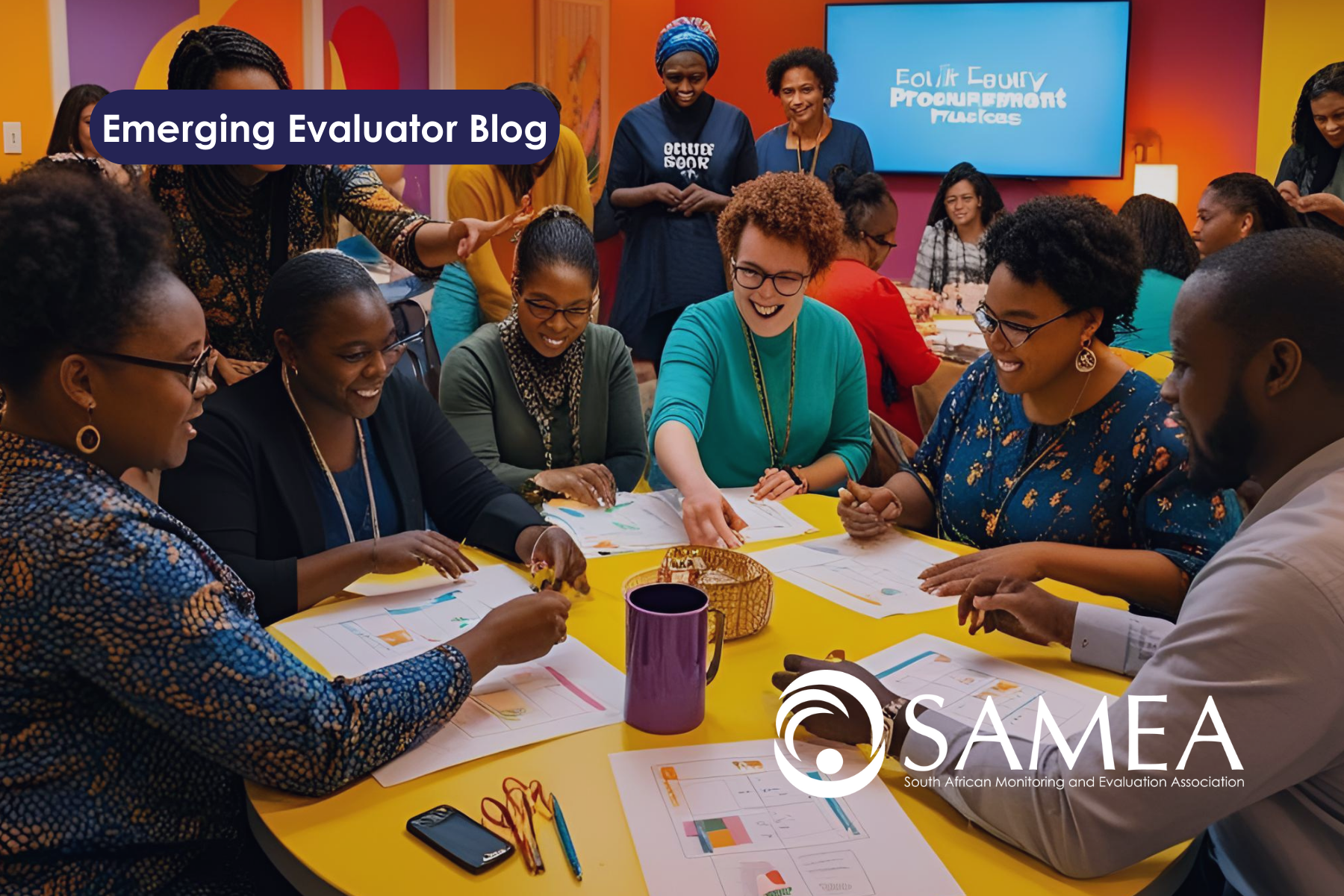Overcoming Prejudicial Racial Biases in Evaluation Procurement Using DPME Equity Procurement Practices

Blog by Tshidi Moilwa – Emerging Evaluator at SAMEA (2024)
Without a competency framework to professionalise the M&E discipline, Western standards are used to measure the competencies of evaluators even in the African context. However, due to racially inequitable misconceptions of competencies, black evaluators are side-lined in procurement processes. In an article from NPJ Biodiversity, the authors argue that Global North researchers are often regarded as experts in their respective fields, “enjoying a reputation beyond their local contexts.” The authors continue to say that conversely, Global South researchers are often perceived as being confined to their own regions, with their scientific authority seen as deriving from the knowledge and expertise originating in the Global North. One cannot completely racialise the uneven playing field of procurement preferences, but one cannot negate the racial experience.
Identified Problem
Racial prejudice in the evaluation field exists because the West is mainly ‘white’, African is mainly ‘black’, and those distinctions are often pitted against each other. At a global level, there is institutional racism, but international and regional institutions have been slow in moving towards balancing and diversifying the equity criteria of evaluators procurements. There is arguably a mute prejudicial perception held by Western evaluators on the inadequacy of South African (and African) evaluators from expanding their skills set. There is a sort of ‘elite’ class of Western evaluators that have a bias against global south evaluators. An anecdote taken from the interviews of Moilwa 2022 unpublished thesis read as such, “a bad experience with one “black” evaluator could create a tendency from “white” evaluation peers to generalise that, ‘these people cannot deliver”. This acts as a stereotype that groups all African evaluators as inadequate, limiting their reach and access to international bids that are dominated by Western evaluators.
Secondly, the scrupulous crafting of Terms of Reference (TORs) that can focus attention on evaluators with proven experience of conducting evaluations for relatively lengthy periods of time, to qualify for bids. In essence, the team members who are Previously Disadvantage Individuals are less likely to take up any leading roles in the evaluations because of their limited years of experience. “To get the job, you need to have experience but you don’t get the opportunities to get the experience, so you will not get the job…” It is common to find an international expert leading an evaluation that is regionally African and/or nationally local, leaving local evaluators to play second fiddle, confined to leading the local contextual setting of the evaluation design.
Importance of Contextually Relevant Evaluators
It is important to consider the extent to which African values and worldviews guide and shape evaluation in African contexts. However, from an unpublished masters, quotes an independent M&E consultant who argues that;…“You cannot discount the importance of the power of culture, and voice around evaluation practice. You cannot completely racialize it but cannot negate the racial experience. You need to have black voices coming through in evaluations that give alternative ways of doing things. The kind of authority a white evaluator has may not have the African epistemological worldview and value a black person may have.” Thus there is a significance in having culturally relevant evaluators.
Possible Solution
The Department of Planning, Monitoring and Evaluation, has a policy called ‘Previously Disadvantaged Individuals’ (PDI), which aims to promote the inclusion of disparaged evaluators by having 40% representation requirements in evaluation teams. It gives an upper hand to “black” evaluators, to a) capacitate marginalised evaluators to gain experience as partners and not subordinates of more seasoned evaluators and b) capacitate those who may lack the extended years of experience to gain the span of experience required to qualify for certain bids. Such an initiative could be considered an equitable take on readdress. The question then becomes, is this an appropriate readdress?
Conclusion
The points for consideration, are just elementary points that do a surface level sweep of exploring the types of racial prejudice that exists in the South African and African evaluation space. It’s a conversation that needs to be exposed and acknowledged in M&E convening spaces. There are probably many more anecdotal prejudicial experiences that exist, just not voiced or consolidated to bring light to this prominent matter. To bring attention to this matter, more documentation needs to be noted on discriminatory practices that judge African evaluators competencies and value based on their racial composition.
It is clear that the M&E global market needs to be widened, opening the distribution of opportunities and access for all evaluators and widened to widened, where evaluation competencies are not measured using ‘Western’ standards. To realise a transformative/emancipatory paradigm shift that enhances the decolonisation principles of MAE, the question remains, should evaluator procurement bids be based on equity, or decided by commissioners of evaluations judgments of competencies using equality? I will conclude with an attempt in answering by saying to overcome prejudicial biases, there needs to be a greater focus on equitable practices, to not level the playing field, but also allow Black evaluators their due recognition in the significance of their racial added advantage.
References
[1] Nakmura, G., Soares, B., Pillar, V., Diniz-Filho, J., & Duarte, L. (2023). The pathways to better recognise the expertise of Global South researches. npj Biodiversity, 2-17.
[2] Ibid Moilwa
[3] Moilwa, M. (2022). Opportunities and challenges for Made in Africa Evaluation Capacity Development: South African experiences . Johannesburg: Wits School of Governance.
[4] DPME. 2011. National Evaluation Policy Framework. 23 November. https://www.dpme.gov.za/publications/Policy%20Framework/National%20Evaluation%20Policy%20Framework.pdf.
Most Recent Read
Discover more topics
